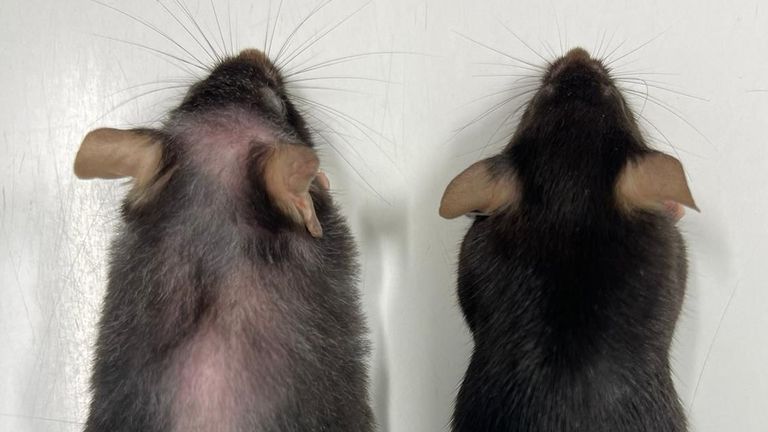An experimental drug that extends the lifespan of mice by 25% could also work in humans, according to the scientist who ran the trials.
The treatment – an injection of an antibody called anti-IL-11 that was given to the mice when they were ‘middle-aged’ – reduced deaths from cancer.
It also lowered the incidence of diseases caused by fibrosis, chronic inflammation and poor metabolism, which are the hallmarks of ageing.
Professor Stuart Cook, a senior scientist on the study, said: “These findings are very exciting.
“While these findings are only in mice, it raises the tantalising possibility that the drugs could have a similar effect in elderly humans.
“The treated mice had fewer cancers, and were free from the usual signs of ageing and frailty, but we also saw reduced muscle wasting and improvement in muscle strength.
“In other words, the old mice receiving anti-IL-11 were healthier.”
Videos released by the scientists show untreated mice had greying patches on their fur, with hair loss and weight gain.
But those receiving the injection had glossy coats and were more active.
The researchers, from the Medical Research Council Laboratory of Medical Science (MRC LMS), Imperial College London and Duke-NUS Medical School in Singapore, gave the mice the antibody injection when they were 75 weeks old – equivalent to a human age of 55 years.
The mice went on to live to an average of 155 weeks, 35 weeks longer than mice who were not treated, according to results published in the journal Nature.
The drug appeared to have very few side effects.
“Previously proposed life-extending drugs and treatments have either had poor side-effect profiles, or don’t work in both sexes, or could extend life, but not healthy life – however this does not appear to be the case for IL-11,” Professor Cook said.
The antibody blocked the action of the IL-11 protein, which is thought to play a role in the ageing of cells and body tissues – in humans as well as mice.
Professor Cook said: “The IL-11 gene activity increases in all tissues in the mouse with age.
“When it gets turned on it causes multimorbidity, which is diseases of ageing and loss of function across the whole body, ranging from eyesight to hearing, from muscle to hair, and from the pump function of the heart to the kidneys.”
Scientists have been trying to find a way of slowing the ageing process in the body so people can remain healthier for longer.
Older people tend to have multiple diseases related to their age, with significant impacts on their quality of life as well as costs to the NHS.
A diabetes drug called metformin has also shown promising results in early studies.
There have also been experiments with severe calorie restriction in people.
However, other scientists are sceptical of ‘treating’ ageing.
Ilaria Bellantuono, professor of musculoskeletal ageing at the University of Sheffield, said: “The problem with all these interventions is that we do not have evidence in patients.
“Although trials are under way in the USA, there are scientific hurdles to overcome to use these interventions in patients, such as understanding who is at risk of frailty and would benefit from the intervention.
“It is unthinkable to treat every 50-year-old for the rest of their life. Every drug has side effects and there is a cost associated with it.”



























